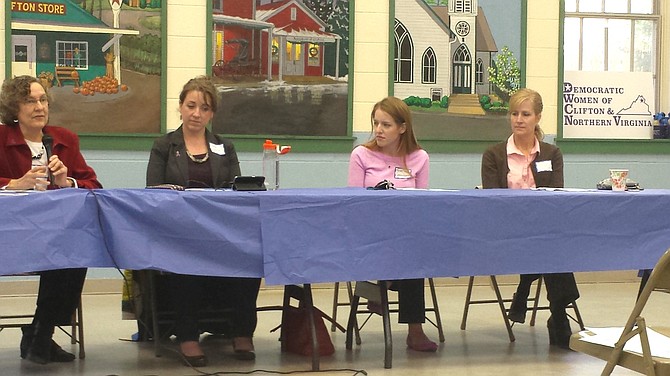(From left) Panelists Melanie Dunn-Chadwick, Nora Mahoney, Heather Sarmiento and Jacqui Smith were hosted by the Democratic Women of Clifton and Northern Virginia for a public meeting discussing domestic violence in Northern Virginia. The panel took place at Clifton Town Hall on Oct. 18. Photo by Marissa Beale/The Connection
Last month, in recognition of October as Domestic Violence Awareness Month, the Democratic Women of Clifton and Northern Virginia (DWCNV) hosted a panel of experts to discuss trends, causes, treatment and prevention of domestic violence in Northern Virginia.
Melanie Dunn-Chadwick, violence prevention specialist with the Fairfax County Public Schools’ FECEP/Head Start Program; Nora Mahoney, Family Law Practice Group Chair for Legal Services of Northern Virginia; Heather Sarmiento, M.Ed., prevention and education coordinator in the Fairfax County Office for Women and Domestic and Sexual Violence Services; and Jacqi Smith, Domestic Violence detective with the Fairfax County Police Department, Sully District Station, made up the panel of speakers. The discussion took place at Clifton Town Hall and each panelist spoke from different angles about difficulties surrounding domestic violence.
ONE MAJOR FACTOR making it difficult to handle the number of domestic violence cases is the number of attorneys available. In Fiscal Year 2015, Legal Services of Northern Virginia handled over 5000 cases of varying types, and about 40 percent of those were family law cases. LSNV provides free legal assistance to families living at or below 200 percent of the federal poverty level. In order to serve more families, the newly-launched Dunn-Chadwick Fellowship funds a recent law school graduate to provide assistance to domestic violence victims making just over that income limit. However, the Fellowship is funded through private donations and may not continue without additional support.
“Legal services and representation for victims has been proven to reduce the rate of domestic violence,” said Mahoney. “There are lots of populations affected, no matter where they are financially.”
Domestic violence can come from a cycle of abuse that the victim or even perpetrator might have been exposed to growing up.
“The most important thing is educating the victim,” said Sarmiento. “One in three is experiencing teen dating violence and abuse via social media, texting, etc.”
The panelists pointed out that we all have either a direct or indirect connection to domestic violence, and even if we are not directly connected, it’s important to know warning signs.
“We all try to do things around issues we think we have connections to,” said Dunn-Chadwick. “But all of us have connections to [domestic violence], either directly or indirectly. And we have to take responsibility as a community.”
Signs of domestic violence can include isolation, psychological and physical abuse, threats, and controlling many aspects of victims’ lives.
Victims have many reasons for remaining in an abusive relationship. Some reasons include lack of money, fear and simply not knowing where to turn.
“I have worked with victims who wanted to stay because they had horses they didn’t want to leave behind,” said Mahoney. “[Other victims] didn’t have transportation.”
Detective Smith, who sits on the Fatality Review Committee, which reviews domestic fatalities in Fairfax County to better improve response to domestic violence calls, investigates domestic violence cases.
“Victims, offenders and sometimes children will call,” said Detective Smith. Using a new Lethality Assessment Program, the Fatality Review Committee is able to quickly identify victims of domestic abuse who are at higher risk of serious injury or death at the hands of their spouses.
“Certain answers trigger a call to a LAP Line. The purpose is to get the victim in touch with services immediately,” said Detective Smith.
“Domestic violence is 100 percent preventable,” said Sarmiento in closing.
THOSE AT RISK, or those who know someone who could be at risk should contact the Fairfax County Police Department, Legal Services of Northern Virginia or the Northern Virginia Domestic Violence Action Center (DVAC) at fairfaxcounty.gov/domesticviolence/dvac and check out http://fairfaxdvcommunity.org.
For more information about the Democratic Women of Clifton and Northern Virginia, visit democraticwomenofclifton.org or write to them at cliftonwomendems@aol.com. The organization welcomes all democratic women in Northern Virginia.
